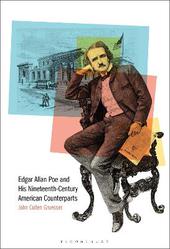
|
Edgar Allan Poe and His Nineteenth-Century American Counterparts
Paperback / softback
Main Details
Description
Winner of the 2019 Patrick F. Quinn Award for the best book on Poe (awarded by the Poe Studies Association) Edgar Allan Poe and His Nineteenth-Century American Counterparts addresses Poe's connections with, critical assessments of, borrowings from, and effect on his literary peers. It situates Poe within his own time and place, paying particular attention to his interactions with, and impact on, figures such as Nathaniel Hawthorne, Walt Whitman, Herman Melville, Mark Twain, Harriet Jacobs, and Pauline Hopkins. John Cullen Gruesser rebuts myths that continue to cling to Poe, demonstrates Poe's ability to transform themes he encountered in the works of his literary contemporaries into great literature, and establishes the profound influence of Poe's invention of detective fiction on nineteenth-century American writers.
Author Biography
John Cullen Gruesser is Senior Research Scholar of Literary Studies at Sam Houston State University, USA. He is the author or editor of ten books and a past President of the Poe Studies Association.
ReviewsA smart, crisply written, and engaging study ... The book will be useful not just for students of Poe and nineteenth-century publishing but also for teachers looking to weave Poe into their US literature offerings in news ways ... Gruesser shows how central he was to a striking variety of writers publishing in the decades after his death. * American Literary History * [The] pieces collected here raise intriguing possibilities for understandings of Poe's connections to other American writers, his position in antebellum print culture, and his influence upon both his contemporaries and subsequent authors ... Gruesser's new book offers a solid contribution to the body of Poe scholarship ... The Poe that Gruesser offers his readers is one who is very much a part of his world, actively engaged in and profoundly influential on American literary culture in the nineteenth century. -- Paul C. Jones * Poe Studies * [I]t contributes to debunking some of the more popular myths about Poe's life and literary achievement in a manner accessible even to readers who have no more than a passing familiarity with Poe's work ... Gruesser's book counters misconceptions by presenting a series of original contributions to scholarship that are at once granular and important ... Gruesser then makes an original, persuasive connection between the rhetorical persona Poe fashions in [his] editorials and those he creates with his tales ... Gruesser's book is potentially of use and interest to all scholars and students of, as well as informed readers with an avid interest in, Poe and nineteenth-century American literature. -- Sean Moreland * The Edgar Allan Poe Review * In the crowded field of Poe criticism, John Cullen Gruesser stands out for the range, erudition, and accessibility of his work. By charting Poe's place in American literary culture while also dispelling myths about him and his work, this book captures perfectly the qualities that make Poe both unique and simultaneously representative of his times. * David Schmid, Associate Professor of English, State University of New York at Buffalo, USA * Edgar Allan Poe and His Nineteenth-Century American Counterparts is a meticulous work of scholarship that expands our knowledge of Poe's place in our literary tradition. Drawing on his remarkable command of Poe scholarship, John Cullen Gruesser rescues the author from the process of mystification that still hangs around him. He reveals new connections to Hawthorne, Melville, and Twain and such lesser known figures as Joel Tyler Headley and Mrs. E.D.E.N. Southworth. His exploration of the ways in which Poe not only invents but continuously reinvents crime fiction into a richly metafictional form capable of confronting racial and political ideologies is both perceptive and persuasive. * Alfred Bendixen, Lecturer in English, Princeton University, USA, and co-editor of The Centrality of Crime Fiction in American Literary Culture (2017) * John Gruesser always writes with passion and purpose, and his Edgar Allan Poe and his Nineteenth-Century American Counterparts illuminates two key facets of Poe's career: his preoccupation with exposing the secret practices of antebellum American literary culture and his invention of the alluring paradigm for detective fiction. In the process, Gruesser creates a vivid narrative of Poe's entanglements with other literary lives, especially with such counterparts as Melville, Hawthorne, Fuller, Whitman, and Willis. But he also suggests the irresistibility of the 'ratiocinative' tale and its repurposing by such unlikely figures as Twain, Southworth, Jacobs, and Hopkins. These linked essays connect Poe to a broader culture and a longer historical moment; they also bring into sharper focus Poe's twin penchants for mystification and revelation. * J. Gerald Kennedy, Boyd Professor of English, Louisiana State University, USA, and author of Strange Nation: Literary Nationalism and Cultural Conflict in the Age of Poe (2016) *
|